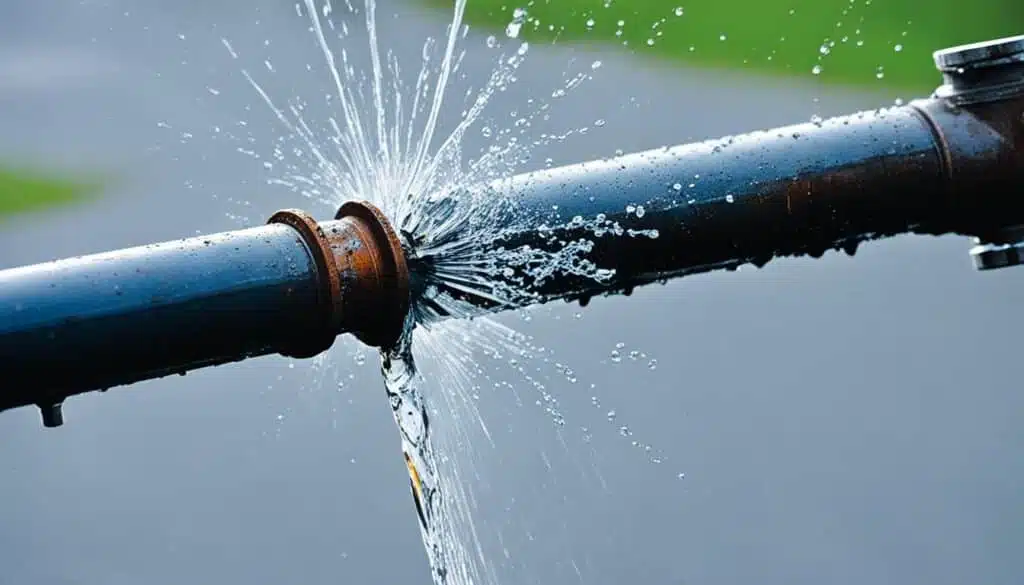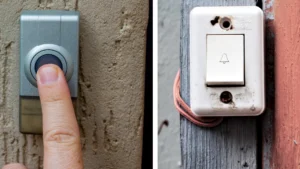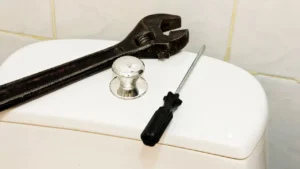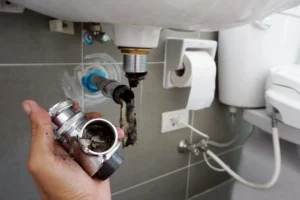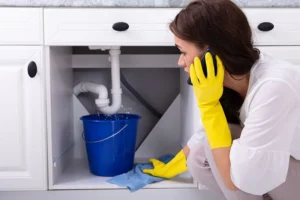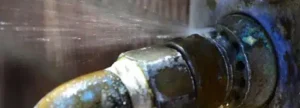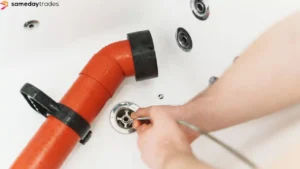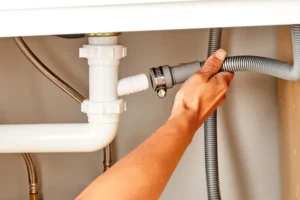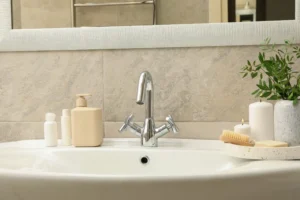A burst pipe can turn your home into chaos in minutes. Broken pipes spill water fast, damaging walls, floors, and furniture. This informational guide will help you act quickly to limit the mess and fix the issue.
Turn Off the Water Supply
Find the main water valve and shut it off straight away. This stops more water from leaking into your home. Usually, the valve is near the metre or where the pipe enters the house—check basements, garages, or laundry rooms.
Open all water taps to drain any leftover water in pipes. Flush toilets too, so no more pressure builds up. This step helps avoid further damage while waiting for burst pipe repair.
Switch Off the Electricity
Water and electricity don’t mix. Shut off the power at your home’s switchboard to avoid shocks or fires. If water from a burst pipe has reached electrical outlets, cables, or switches, act swiftly.
Call an electrician if you’re unsure about safety. Keep everyone clear of wet areas until it’s confirmed safe. Neglecting this step could cause severe damage or lead to accidents.
Don’t take chances with exposed wires near standing water!
Contain the Water
Grab buckets, pots, or any large containers to catch dripping water from the burst pipes. Towels and mops can help soak up smaller puddles on the floor quickly. If a broken water pipe sprays heavily, use thick tape or an old cloth as a temporary wrap to lessen the flow.
Move rugs, furniture, and other personal belongings out of harm’s way. This stops further damage and preserves your valuables. Shut doors leading to unaffected rooms so water doesn’t spread further across your home.
Inspect the Damage
Look for signs of damage like rust, discoloration, or visible leaks near the burst pipe location. Check floors and walls for water stains or peeling paint. A strong musty odour may point to hidden water damage or mildew growth.
Inspect your structural integrity too. Warping wood, soggy floors, or cracked tiles could mean deeper issues from a burst water pipe. Take clear photos of the affected areas. This helps with home insurance claims later on.
Call a Professional Plumber
A burst pipe can get ugly fast. Call a local plumber experienced in broken pipe repair instantly. Same Day Trades plumbers are ready 24/7 to help with water leaks or burst water pipes.
We offer quick services and cover Adelaide, Brisbane, Perth, and more! Professional plumbers handle emergencies before things spiral out of control.
Avoid using chemical drain cleaners, as they can corrode pipes further over time.
Remove Water from the Affected Area
Water sitting in your home can cause big problems. Act fast to stop mould, musty odours, and further damage.
- Use towels to soak up standing water quickly. Be thorough, even in corners.
- Grab a wet/dry vacuum for larger puddles or areas soaked with water. It’s faster than towels.
- Turn on fans around the room to help air flow. This speeds drying for walls, floors, and furniture.
- Run dehumidifiers near wet spots to pull moisture from the air. It stops dampness from spreading.
- Open windows or doors if it’s not raining outside. Fresh air helps dry things out faster.
- Move personal belongings like rugs, books, or electronics before they soak up water damage.
- Check under appliances like washing machines or fridges for hidden water pools, as these can be missed easily.
Dry Floors, Walls, and Furniture
A burst pipe can leave your home soaked. Drying it fast helps prevent mould, odours, and further damage.
- Start by soaking up pooled water with towels or mops. Work quickly to stop water from spreading.
- Use fans or dehumidifiers to dry the air. Point the airflow at wet areas like walls and floors.
- Open windows for better ventilation if the weather allows. Fresh air speeds up drying time.
- Wipe down furniture with dry cloths. Remove cushions and let them air out separately.
- Check carpets for trapped moisture underneath. Lift edges if needed to stop mildew growth.
- Avoid using household heaters too close to damp spots. They could damage materials or cause safety risks like fires.
- Homes over 50 years old may have piping wear issues, so act quickly to avoid repeated pipe bursts in those areas.
Document the Damage for Insurance
Take photos of the burst water main, damaged floors, walls, or furniture. Snap close-ups and wide shots to show scale. List every item harmed by the water pipe burst. Include details like brand names or purchase dates.
Contact your homeowners insurance agent right away. Burst pipe damages account for 22% of claims under standard policies, so you’re likely covered. Ask them about extra protections like service line cover or valuables coverage if needed.
Prevent Future Pipe Bursts
Insulate your plumbing pipes, especially in cold or unheated spaces like basements. This helps keep them from freezing and bursting in winter. Use foam covers or heat tape for added protection.
Always maintain a thermostat setting of at least 13°C (55°F) during colder months to stop water from freezing inside the pipes.
Manage your water pressure with a pressure-reducing valve or gauge. High pressure can stress pipelines over time, causing cracks and leaks. Fix leaks quickly before they get worse, and replace corroded or old pipes regularly to avoid unexpected bursts.
In freezing weather, leave taps slightly open so water keeps flowing—moving water is less likely to freeze solid!
Conclusion
A burst pipe can turn your day upside down, but quick action makes a world of difference. Shut off the water, protect your home, and call a plumber fast. Learn from this experience by maintaining your plumbing and staying prepared.
A little care now can save you big headaches later. Keep calm, act swiftly, and keep those pipes flowing smoothly!
FAQs
What should I do first if a burst pipe happens?
Turn off the water main immediately to stop the flow. This prevents further damage and buys time to call a burst pipe plumber.
What causes pipes to burst in plumbing systems?
Common causes include corrosion, high pressure from water hammers, or issues with pressure regulators and valves.
How can I prepare for a potential water burst at home?
Regular maintenance is key. Check for signs of wear, install pressure-reducing valves, and inspect your plumbing system for leaks or weak spots.
Are trenchless repairs better for fixing pipe bursting?
Trenchless methods are often quicker and less disruptive than traditional digging but depend on the extent of the damage.
Can hot water pipes also burst?
Yes, hot water pipes can fail due to stress from heat changes or poor installation over time—maintenance helps reduce this risk!

